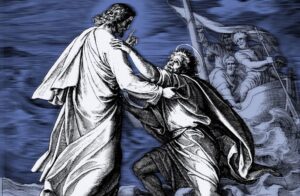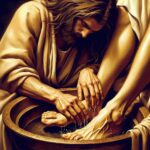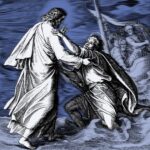John Chapter 13:1-38 King James Bible KJV

Jesus Washes the Disciples’ Feet, Jesus Predicts Judas’ Betrayal, The New Commandment of Love, Jesus Predicts Peter’s Denial
John Chapter 13:1-38 King James Bible KJV. John Chapter 13 marks the beginning of the “Farewell Discourse” in the Gospel of John, where Jesus spends his final hours with his disciples before his crucifixion. This chapter contains the powerful symbolism of Jesus washing his disciples’ feet, predictions of his betrayal and denial, and a new commandment of love. Each element reveals deeper aspects of Jesus’ mission, character, and expectations for his followers.
This chapter shows how Jesus begins preparing his disciples for his departure by embodying and teaching the principles of humility, love, and forgiveness. His example, teachings, and actions serve as a foundation for what it means to be a disciple, centered on a life of love, service, and enduring faith.
Key Themes
- Servant Leadership and Humility: By washing his disciples’ feet, Jesus sets an example of humble, servant-hearted leadership. This act encourages believers to embrace humility and to serve one another selflessly, embodying Jesus’ approach to greatness in God’s kingdom.
- Love as the Defining Mark of Discipleship: The new commandment to “love one another” redefines discipleship around the love Jesus modeled. This love is unconditional and sacrificial, a way of showing God’s love and grace to the world.
- Foreknowledge and Sovereignty of Jesus: Jesus’ awareness of both Judas’ betrayal and Peter’s denial underscores his divine knowledge and control over the unfolding events, even those that seem devastating. This sovereignty reassures believers that God’s plans prevail despite human weakness and betrayal.
- Forgiveness and Restoration: Jesus’ response to Peter’s denial demonstrates his willingness to forgive and restore those who fail. This offers hope to all followers who stumble, showing that Jesus values repentance and continued faithfulness.
John Chapter 13:1-38 King James Bible KJV
—————-

Jesus Washes the Disciples’ Feet – verses 1-17
At the Passover meal, Jesus, knowing that his hour had come and that he would soon leave this world, begins to wash his disciples’ feet. Foot washing was typically a servant’s task, so this act represents radical humility and service. Peter initially resists, saying that it is unthinkable for his master to wash his feet. Jesus responds that unless he washes him, Peter has “no part” with him. Jesus clarifies that this act has a symbolic meaning, indicating a need for spiritual cleansing and humility.
After washing their feet, Jesus tells them, “I have set you an example that you should do as I have done for you.” This act becomes a model for the type of humble, sacrificial service that Jesus expects from his followers. It shows that leadership and greatness in God’s kingdom are defined by humility and a willingness to serve others selflessly.

Jesus Predicts His Betrayal – verses 18-30
Jesus, deeply troubled, announces that one of the disciples will betray him. This prophecy distresses the disciples, and they anxiously wonder who among them would do such a thing. Jesus reveals Judas as the betrayer by dipping bread and handing it to him. Judas then leaves, setting in motion the events leading to Jesus’ arrest and crucifixion.
The betrayal of Jesus by Judas highlights the theme of human choice and the sorrow of betrayal, even among close companions. Jesus’ awareness of Judas’ betrayal also reflects his knowledge of human hearts and his acceptance of God’s plan, even when it includes suffering and betrayal.

The New Commandment – verses 31-35
Once Judas departs, Jesus tells his disciples, “Now is the Son of Man glorified, and God is glorified in him.” With the path to the cross now inevitable, Jesus shifts focus to his followers and gives them a “new commandment”: “Love one another. As I have loved you, so you must love one another.”
This commandment elevates love to a new standard. Jesus’ love is self-sacrificing, unconditional, and forgiving, and he calls his disciples to embody this love in their relationships with one another. Jesus emphasizes that this love will be the distinguishing mark of his followers: “By this, everyone will know that you are my disciples, if you love one another.” This commandment points to the communal nature of Christian faith and the essential role of love in demonstrating God’s presence in the world.


Jesus Predicts Peter’s Denial -verses 36-38
Peter declares his willingness to lay down his life for Jesus, but Jesus, knowing Peter’s limitations, foretells that Peter will deny him three times before dawn. Peter’s well-meaning but ultimately flawed declaration shows the gap between human intentions and human limitations. Jesus’ prediction of Peter’s denial reminds the disciples, and all believers, that they must rely on God’s strength rather than their own to remain faithful.
This moment highlights the themes of human frailty, the need for humility, and the grace Jesus extends even when we fail. Jesus foresees Peter’s denial yet continues to love and restore him afterward, showing that failure does not disqualify one from being a disciple.
John Chapter 13:1-38 King James Bible KJV
1 Now before the feast of the passover, when Jesus knew that his hour was come that he should depart out of this world unto the Father, having loved his own which were in the world, he loved them unto the end.
2 And supper being ended, the devil having now put into the heart of Judas Iscariot, Simon’s son, to betray him;
3 Jesus knowing that the Father had given all things into his hands, and that he was come from God, and went to God;
4 He riseth from supper, and laid aside his garments; and took a towel, and girded himself.
5 After that he poureth water into a bason, and began to wash the disciples’ feet, and to wipe themwith the towel wherewith he was girded.
6 Then cometh he to Simon Peter: and Peter saith unto him, Lord, dost thou wash my feet?
7 Jesus answered and said unto him, What I do thou knowest not now; but thou shalt know hereafter.
8 Peter saith unto him, Thou shalt never wash my feet. Jesus answered him, If I wash thee not, thou hast no part with me.
9 Simon Peter saith unto him, Lord, not my feet only, but also my hands and my head.
10 Jesus saith to him, He that is washed needeth not save to wash his feet, but is clean every whit: and ye are clean, but not all.
11 For he knew who should betray him; therefore said he, Ye are not all clean.
12 So after he had washed their feet, and had taken his garments, and was set down again, he said unto them, Know ye what I have done to you?
13 Ye call me Master and Lord: and ye say well; for so I am.
14 If I then, your Lord and Master, have washed your feet; ye also ought to wash one another’s feet.
15 For I have given you an example, that ye should do as I have done to you.
16 Verily, verily, I say unto you, The servant is not greater than his lord; neither he that is sent greater than he that sent him.
17 If ye know these things, happy are ye if ye do them.

18 I speak not of you all: I know whom I have chosen: but that the scripture may be fulfilled, He that eateth bread with me hath lifted up his heel against me.
19 Now I tell you before it come, that, when it is come to pass, ye may believe that I am he.
20 Verily, verily, I say unto you, He that receiveth whomsoever I send receiveth me; and he that receiveth me receiveth him that sent me.
21 When Jesus had thus said, he was troubled in spirit, and testified, and said, Verily, verily, I say unto you, that one of you shall betray me.
22 Then the disciples looked one on another, doubting of whom he spake.
23 Now there was leaning on Jesus’ bosom one of his disciples, whom Jesus loved.
24 Simon Peter therefore beckoned to him, that he should ask who it should be of whom he spake.
25 He then lying on Jesus’ breast saith unto him, Lord, who is it?
26 Jesus answered, He it is, to whom I shall give a sop, when I have dipped it. And when he had dipped the sop, he gave it to Judas Iscariot, the son of Simon.
27 And after the sop Satan entered into him. Then said Jesus unto him, That thou doest, do quickly.
28 Now no man at the table knew for what intent he spake this unto him.
29 For some of them thought, because Judas had the bag, that Jesus had said unto him, Buy those things that we have need of against the feast; or, that he should give something to the poor.

30 He then having received the sop went immediately out: and it was night.
31 Therefore, when he was gone out, Jesus said, Now is the Son of man glorified, and God is glorified in him.
32 If God be glorified in him, God shall also glorify him in himself, and shall straightway glorify him.
33 Little children, yet a little while I am with you. Ye shall seek me: and as I said unto the Jews, Whither I go, ye cannot come; so now I say to you.
34 A new commandment I give unto you, That ye love one another; as I have loved you, that ye also love one another.
35 By this shall all men know that ye are my disciples, if ye have love one to another.

36 Simon Peter said unto him, Lord, whither goest thou? Jesus answered him, Whither I go, thou canst not follow me now; but thou shalt follow me afterwards.
37 Peter said unto him, Lord, why cannot I follow thee now? I will lay down my life for thy sake.
38 Jesus answered him, Wilt thou lay down thy life for my sake? Verily, verily, I say unto thee, The cock shall not crow, till thou hast denied me thrice.
You must be logged in to post a comment.